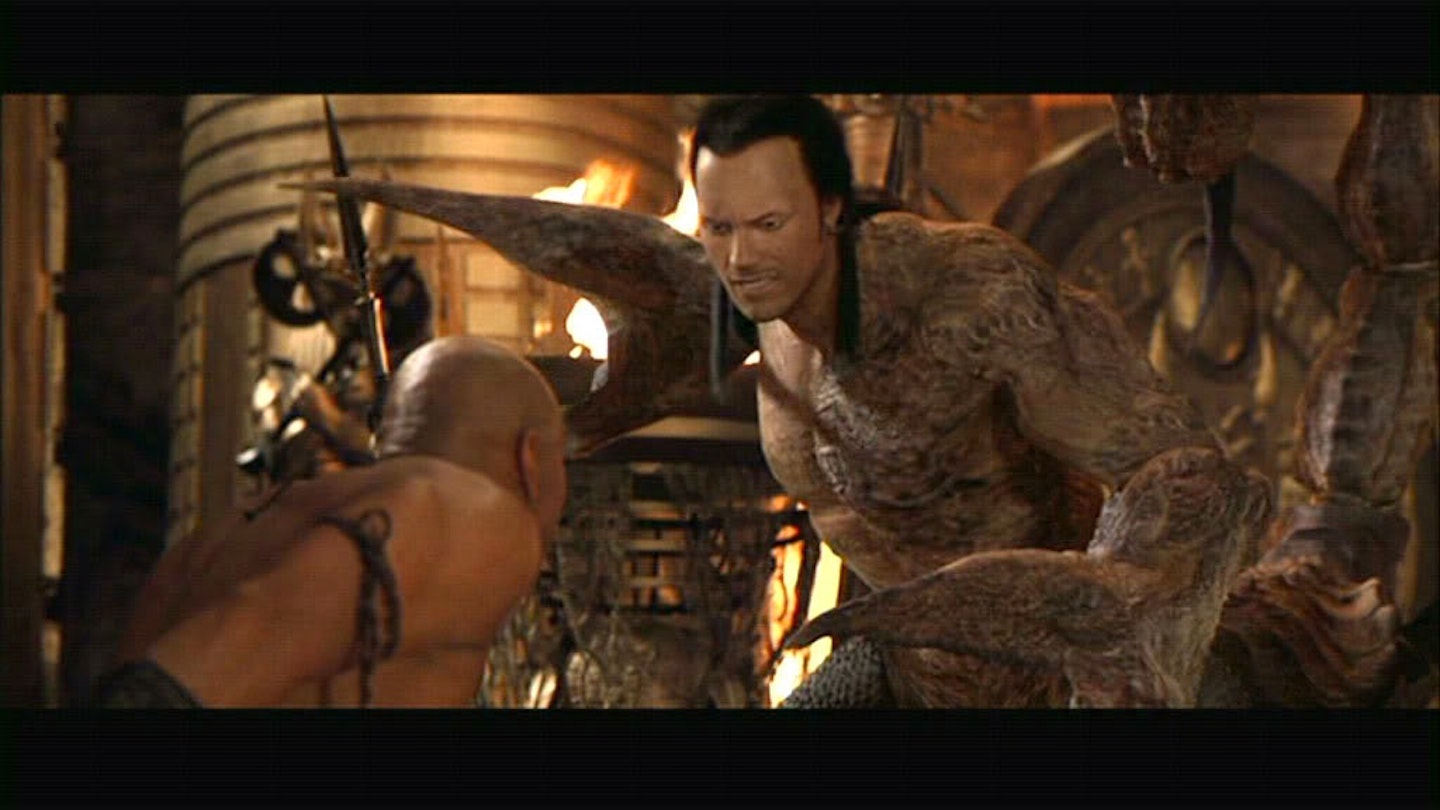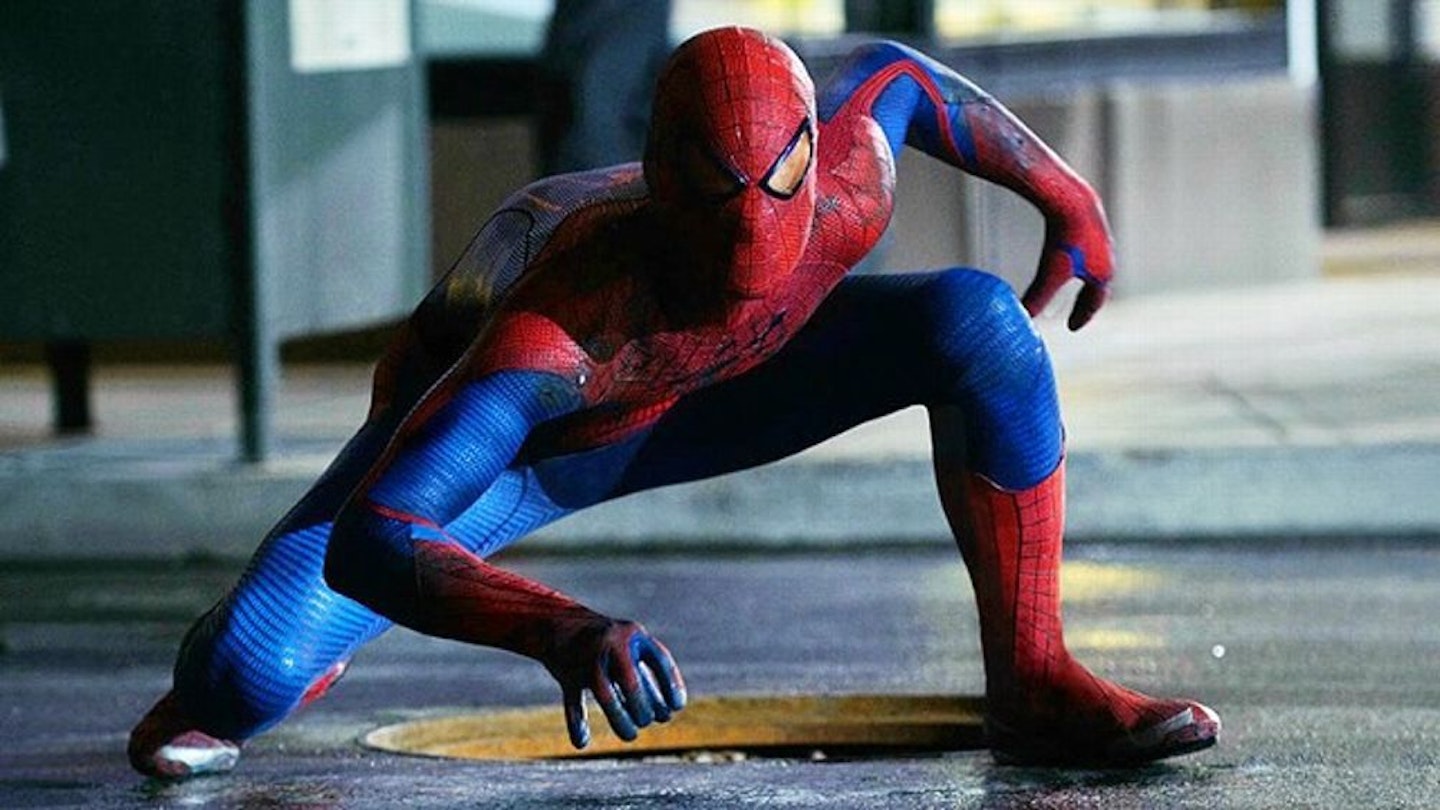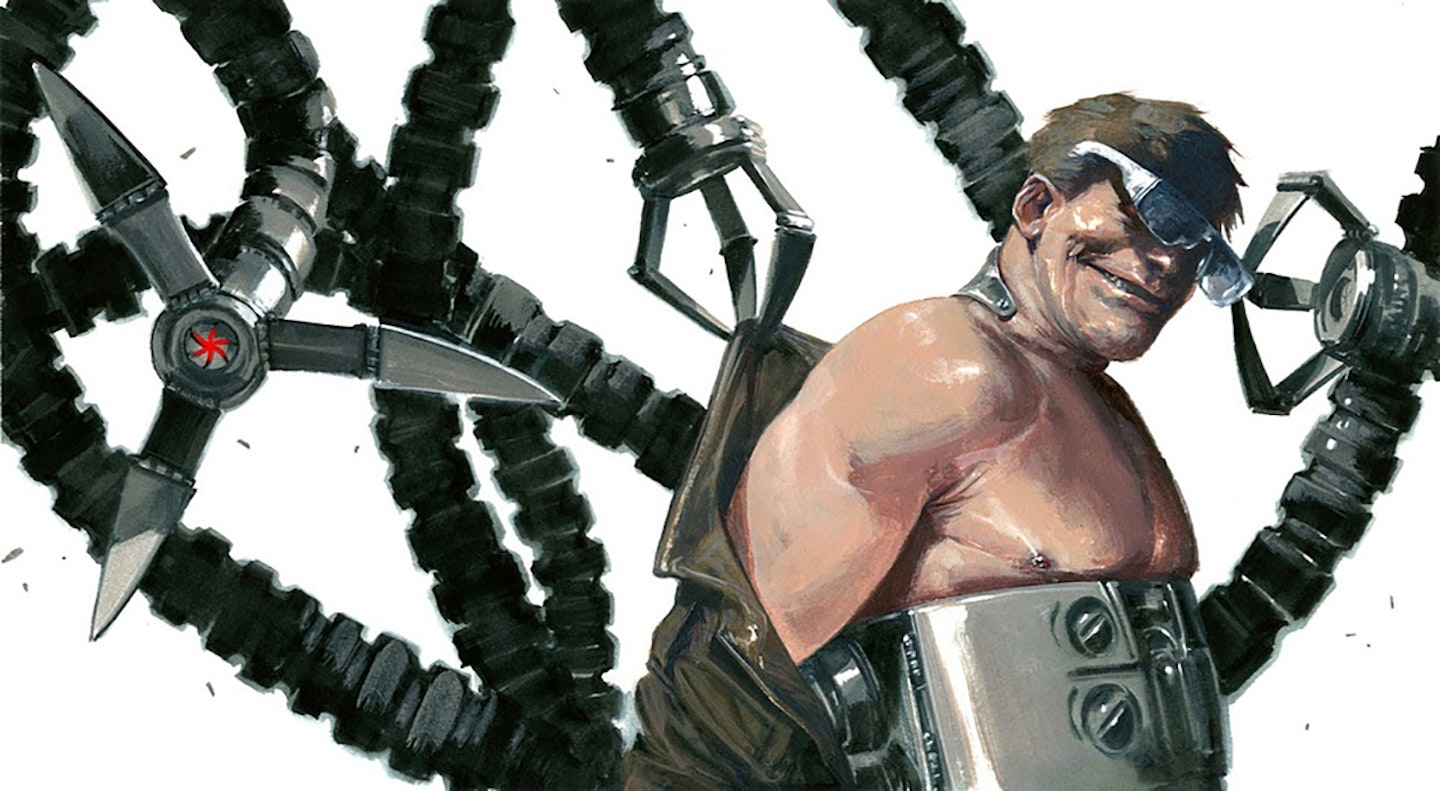The next stage in the development hell that was Spider-Man at Cannon Films in the 1980s was the hiring of writer Ethan Whiley, whose assignment was to write a script that could be produced for no more than five million dollars. According to Whiley, at the time there was some concern that the rights to the character would be expiring shortly, so Cannon desperately needed to get the film in to production as quickly as possible.
Ethan Whiley (Writer): "There were a couple of things — baggage. you might say — that came with the project. It was never explained to me what the actual rights were that they owned. What I was told was that they owned the Spider-Man character, but there was some ambiguity as to whether they owned the other characters from the comic. That didn’t make sense to me, because I used Uncle Ben, Aunt May and certain characters like that. But I was instructed not to use any of the villains like Doctor Octopus. So for my script, I then invented my own Spider-Man villain, which was fun. I tried to create a character that was true to the character, attitude and approach of the comics. So I came up with a man who was a disabled doctor, a paraplegic, who was experimenting with genetic research. He was making incredible, ground-breaking advances in that field, but ultimately had a very personal motivation, because he was paralyzed from the waist down and wanted to walk again. So, in the climax of my script, he injects himself with this dangerous serum and takes on the properties of a scorpion. So he was kind of a scorpion man instead of an octopus man.

"Again, I was trying to use elements where they would feel like they were true to the comic. I had the classic elements of Peter Parker living at home with his aunt and uncle, and getting bitten by a spider that's been genetically mutated instead of radioactive. It was the late eighties and I tried to come up with something that rang a little more true for the times. The era of the Man With The X-Ray Eyes seemed a little dated to me, so I wanted to do something a little bit different than just, ‘Radioactivity created this situation.’ The other interesting thing, and maybe this is why I was hired to do it, is that I was told to write this as a low-budget movie. They knew that they would have to make the film quickly and that there wasn’t a lot of money.”
Whiley was just coming off of the one-two punch of House and House 2, a pair of low budget, effective, effects-driven horror movies which were produced for far lower budgets than even this lower-tier version of the webslinger. Added to this was his background in special effects, having worked for Industrial Light and Magic and Chris Walas, Inc. on such films as Return Of The Jedi and Gremlins.
Whiley: "I was coming to the scriptwriting process not just as a writer but someone with production experience, effects experience and actual directing experience, and was someone who could shape a movie that could be done at a budget like that. And, of course, write something that would be realistic to that approach. So my general structure and concept was to have Peter Parker become Spider-Man almost at the end of the movie. My thinking was that I wouldn’t have the money to have him flying all over the city, doing lots of, what would have been at that time, blue screen shots. This was before the age of digital filmmaking. And also the practicality of giant set pieces and shooting in the middle of cities. So I avoided a lot of that and really focused on the evolution of Peter Parker into Spider-Man. I kind of explored that aspect of the story in more detail, perhaps, than earlier or later drafts did. It was also his coming to terms with his moral responsibility to society. One of the things that I always loved about the Spider-Man character — and I’m no die-hard comic book freak by any stretch of the imagination — is that he was the first teen-aged superhero. I thought that was an interesting thing, so I really looked at it as a metaphor for him being a teenager growing into a man, and taking on the responsibilities of what it means to be an adult; getting involved in society, responsibilities for family.
"As I recall, I had that classic scene, taken from the comics, where he’s thwarting a crime and he’s forgotten that he has Aunt May’s heart medicine that he’s supposed to get back to her. By the time he gets back home, she’s being hauled off on an ambulance. He’s almost killed her and he realizes, ‘Here I was stopping this street crime, for someone I don’t even know, and I forgot that I had to get the medicine back to her.’ So, to me, that would crystallize the conflict in Spider-Man. Those were the things that I emphasized in the storytelling, as well as his coming up with the idea of becoming a superhero. How does he start designing the costume? How does he get it together and where does his own personal tragedies finally propel him to become a vigilante, essentially? The script ended with his finally realizing that this is his destiny, to become Spider-Man.

"I actually thought it made a pretty compelling story. Now the idea was that if it did well and was successful, then you were really set up to do a series of Spider-Man movies. You kind of use the first movie to set up the premise of the following sequels. In story number two you’ve got money because the first one was successful, now you jump right into the adventure and you don’t have to tell his origin. At least that was my clever idea, but not clever enough, I guess."
In 1989, the situation with Cannon was not improving, and Menahem Golan was seen as an impediment. Paretti began making moves that would have the filmmaker fired from his own company.
Whiley: “It’s always tough for independents. And it’s always a struggle. A couple of the success stories in independents — Miramax, New Line, for example — were really defined by one really major hit movie that exploded onto the national consciousness and the national box office. New Line had struggled for, like, twenty years as an art house kind of company and Miramax had struggled along with lots of Oscars but not a lot of money, and then Nightmare On Elm Street and Scream turned into huge hits. A lot of these independent film companies needed that big, defining cash cow, and I think that that had eluded Cannon. I think there was a possibility you could get in there with a little fun movie, but with Menahem Golan at the helm I don’t know if he had the strongest sense of what would make a commercial hit in America at the time.”
In any case, Golan’s “time” with Cannon was coming to an end. The future was not bright for the company, and Golan was seen by Paretti as the sacrificial lamb.
Joe Zito (Director): “When Golan was forced out of the company, he was offered a ‘golden parachute,’ which was supposed to translate to a great deal of money. But the deal never could close, so in negotiation he took properties with him, and Spider-Man was one of them.”
Golan formed 21st Century Films with the hopes of bringing back the “golden age” of Cannon. His first step was to re negotiate the Spider-Man deal, which was originally set to expire in August of 1990, with Marvel, which he managed to do. He immediately put writer Frank LaLoggia — the writer, director composer and star of the thriller Lady In White — on the project. He was followed by Neil Ruttenberg. who had previously written the film Deathstalker II.

Neil Ruttenberg (Writer): "My experience on Spider-Man wasn’t exactly fulfilling. I desperately wanted to get back to the character’s roots, but no one at 21st Century seemed particularly interested in doing so. I wanted to go back to the comic book. I had a good relationship with Stan Lee, though he was more of an idea guy. It wasn’t really hands on for him. He liked to sit around and talk a lot. We had a pretty good working relationship, and I had a pretty good relationship with Menahem Golan, because I respected him. Even though a lot of his films weren’t very good, he knew a lot about film. The flaw in his whole organization was the people he had working for him. Menahem knew a lot about movies and had good taste in the projects he chose, he just was unable to translate that to his own films. He had a story editor who didn’t have a clue. The whole process of me writing Spider-Man was completely hamstrung by this guy. He had incredibly bad ideas and no feel for the material. He would continually derail the process and I had no more contact with Menahem after that, because this guy put himself between me and Menahem.
“After I finished the draft Menahem was very happy, but the whole project seemed to be derailed again. Menahem’s company always seemed to be struggling. He wasn’t real respected in the community, having made some really terrible movies – though they probably wouldn’t be considered terrible by today’s standards. He just didn’t have the reputation that he actually deserved. Again, his organization and his cheapness just kind of did him in. After that, I kind of moved on.”

In terms of the film’s story itself, Ruttenberg wanted to deal with Peter Parker’s adolescent angst, which he feels is what underlined his entire story. Additionally, he wanted to use Doc Ock as the villain.
Ruttenberg: “The better the villain, the better the movie,” he says matter of factly. “Doc Ock, to me, was the only Spider-Man villain that was worth a damn. Spider-Man’s greatest flaw was that most of the villains were never any good, but Ock was crazy and had appendages. The whole idea of Doc Ock was that you could really go to town with the prosthetics, which is what gives you your bigger bang for the buck. At that time prosthetic devices were not really well advanced, but they were still pretty good. So, for me, it was all about teenage angst, but the story editor wanted Spider-Man to be grabbing breasts and things like that. Again, he didn’t have a feel for the material. Roger Corman was the king of exploitation, and that’s who I trained with, but even Roger understood that there had to be some intellectual content, even though that failed to translate years afterward. He would hire directors who didn’t understand what exploitation really was. Again, it was exploitation with breasts and crude jokes, but it didn’t work. I would say my script didn’t work for the reason that the chemistry with the executives was all wrong. Menahem would tend to grab on to an idea, love it, then divorce himself from it and let his staff deal with it and move on to the next big deal. He was running towards the end of his career, but he was still trying to play the kingmaker.”
Interestingly, he wrote for a slightly higher than expected budget, somewhere in the ten to fifteen million dollar range.

Ruttenberg: “I was looking at it as a big budget movie for that time. I wanted a lot of aerial acrobat kind of things; that was my vision of it. But I’m sure as their money coffers dwindled, they started making them lower and lower. I never tailored my script to anything. Rereading it now, I know it’s not as good as I could make it today, but I know in my mind what I wanted to get, and I know that I was stopped from giving it. There was a huge age difference between me and the executive. He was in his sixties and he was of a different generation, too. He wasn’t like somebody from the sixties who grew up with it and understood teenage angst. He was much older than that. He was coming at it purely from the exploitive, ‘How can we do tits and ass?’ school of thought, which didn’t appeal to me at all.”
The word “exploitation” was seemingly destined to drop away from the Spider-Man project as it moved on to its next phase and filmmaker James Cameron.
](http://www.empireonline.com/movies/features/part-3-spider-man-cannon-cameron/part-3-spider-man-cannon-cameron?auto=format&w=1440&q=80)
